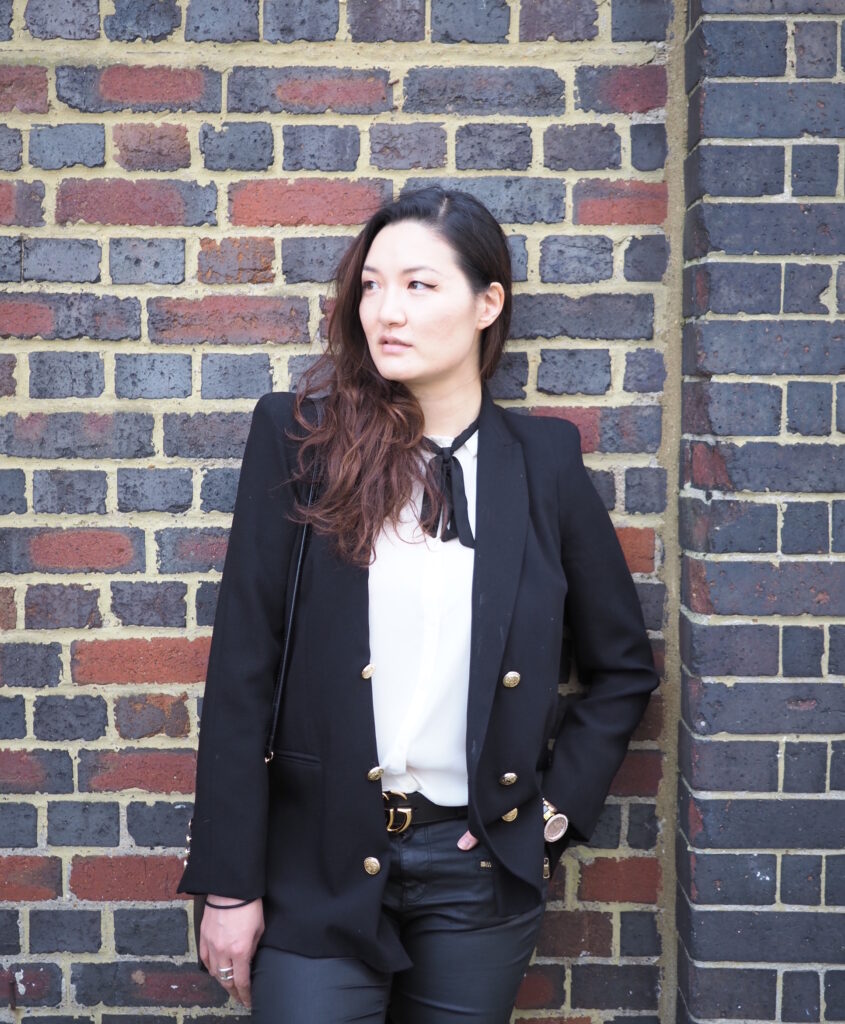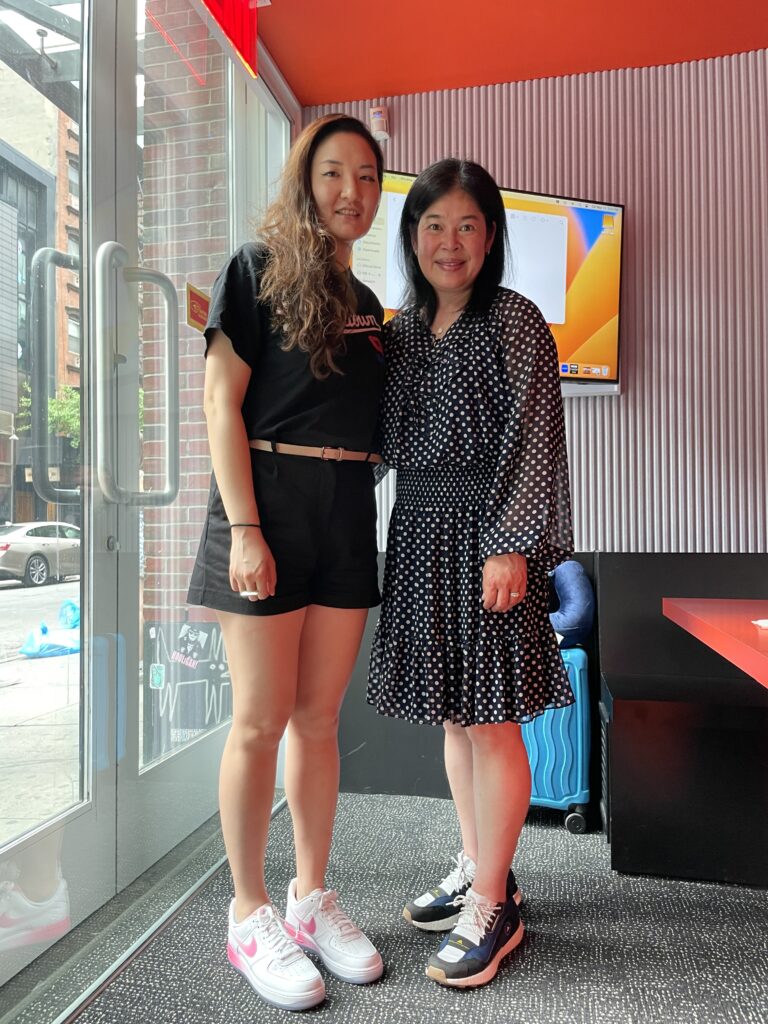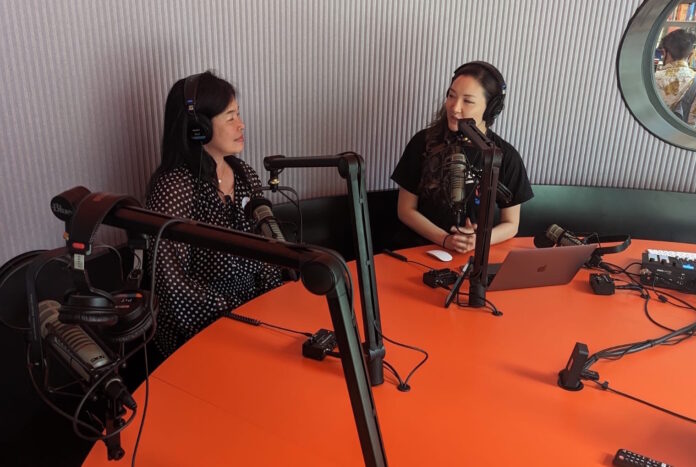By Jia H. Jung, California Local News Fellow
Korean American Hannah Kang, born and raised in Flushing, Queens, has dropped the first episode of her weekly The Tiger in the Room (타이거룸).
The title of the series is a play on the phrase “elephant in the room.”
Kang wrote to AsAmNews, “our mission is to spotlight raw discussions and challenging truths regarding anti-Asian hate and racism against Asians. We strive to amplify the voices of activists and community leaders who boldly speak out for our community, even when their perspectives may not align with popular opinion.”
In a phone call, Kang said that public figures from the Asian and Pacific Islander community who appear in her limited edition podcast will explore tensions between the Black and Asian community that exist alongside a history of Black and Asian solidarity.
The show will also examine class and experiential differences behind the rise of the concept of “boba liberals.” The slang term refers to economically privileged, usually East Asian Americans perceived to be most often presented by the media as the spokespeople of Asian and Pacific Islander communities, to the alienation of many who feel incorrectly lumped together under the “AANHPI” racial/ethnic construct.
The phrase has become broadly characterized by the mainstream press and dominant Asian liberal voice it highlights as being a divisive tool of political conservatives, when in reality, other moderate liberals and far leftists continue to find resonance in the concept as well.
Kang, the show’s creator, producer, and host, chose today for her release in honor of the third anniversary of the death of Vicha Ratanapakdee.
Ratanapakdee, a Thai immigrant, was 84 years old and had poor eyesight. He was recovering from a recent heart surgery while strolling in his neighborhood of Anza Vista, San Francisco on Jan. 28, 2021. This was part of his daily routine after preparing his grandsons for school.
Suddenly, a young male adult sprinted at him and shoved him to the ground.
The elderly man’s head hit the pavement. He lay there until a neighbor found him unconscious and called for help. Without ever regaining consciousness, Ratanapakdee died two days later of a brain hemorrhage at San Francisco General Hospital.
The tragic death, widely considered the marker of the first wave of attacks of Asian people in the Bay Area of California, galvanized the nationwide Stop Asian Hate movement.
That August, a mural of a Jonathan Chang portrait rendered by artists Thitiwat Phromratanapongse and Sarah Siskin went up in his memory. In 2022, the city renamed Sonora Lane as “Vicha Ratanapakdee Way” after a unanimous resolution. Ratanapakdee’s daughter Monthanus established the Justice For Vicha Ratanapakdee Foundation, known more shortly as “Justice 4 Vicha.”
The Foundation continues to remember “Grandpa Vicha” for his journey as one of eight children who grew up on his family’s farm in Thailand before becoming an auditor at a large financial institution, traveling the world, and joining his daughter and son-in-law in San Francisco to help care for their children.
One of the installments of Kang’s 10-episode passion project is an in-depth conversation with Monthanus.
But the featured guest of the very first segment is rapper, Internet personality, and activist China Mac. Mac, whose real name is Raymond Yu, grew up in New York City’s Chinatown and was in and out of the juvenile system as a young boy before joining the Ghost Shadow gang and landing in Rikers Island prison for 11 years after being convicted for shooting and seriously wounding a man.
On Aug. 1, 2020, approximately three years after leaving jail, he and actor/producer Will Lex Ham led a march in the Bensonhurst neighborhood of Queens after two teenagers set an 89-year-old Chinese grandmother there. They called the rally They Can’t Burn Us All. Mac also released a rap single by the same name.
The elderly woman’s attack on Jul. 11, 2020 was one of many that long preceded the national awakening that came with the killing of Ratanapakdee on the West Coast and even the pandemic that Donald Trump used as free license to label the universal COVID-19 virus as “the China virus” and “the kung flu.”
“It hurts to know that the same country that you’re born and raised, hates you or doesn’t see you as equal. This is my country. I’m just fighting because it’s the right thing to do,” he told Al Jazeera, shortly after the organized event.
Mac ended up at the helm of a movement that resounded in Los Angeles and San Francisco among people who felt angry and terrified and wanted the violence against the community to stop.
Kang said that Mac was kind and responsive to her request for an interview, setting aside the time to converse with her at length online when he could not make it to the recording studio.
On video, he talked with Kang about what it has been like being one of the first platforms helping Asian people speak out together, and secrets to organizing the diverse and at times polarized Asian community.
Saying he learned how to advocate for himself not from his own parents but from the parents of his Black friends, he spoke of the importance of encouraging the Asian community to fight for respect.
“It’s gonna take something major to get everybody on the same page,” Mac mused, while also wondering how negative an event would have to be to prompt cohesive action.

Respected by his followers for his tough youth, rap career, and harmony with cross-cultural communities, Mac has been unafraid to lend views that are hedged neither by privilege or White guilt.
Atoning for the history and perception of systemically racist, negatively biased depictions of Black people by the media has been an expressed priority of the mainstream since the murder of George Floyd. Outlets and supporters of Black communities have been eager to acknowledge the equally real, overlooked, and forgotten history of Black and Asian solidarity.
However, rarely has the media or other entity dared to broach even the question of whether most of the violent attacks against Asian people in fact have been committed by Black people. Nor has there been public space for discussions about what such a thing would mean for American race relations, let alone what could be done about it.
Dr. Janelle Wong, director of the Asian American Studies Program at the University of Maryland, went further with a study and analysis concluding that 73% of attackers of Asian people before and during the pandemic have been White.
Wong’s study alleged that observations of attacks in epicenters of Asian-targeted violence like New York City did not constitute empirical evidence. She reduced impressions that a particular frequency of Black men were at times fatally attacking Asian women to self-selecting viral online footage from cameras already set up in the lowest-income, highest crime areas – a claim potentially problematic and circular for begging the assumption that low-income, high-crime neighborhoods is where Black attackers present.
Users of online forums like Reddit slammed the study for using data from the 1990s through 2014. For applying a methodology that collapses counts of violent crime with self-reported instances of verbal abuse and shunning. And for only counting Asian hate crimes as those classified as such by law enforcement.
The NYPD did not charge Assamad Nash with a hate crime on top of murder, burglary, and sexually motivated burglary after he stabbed 35-year-old Korean American creative producer Christina Yuna Lee to her death over 40 times in the neck and torso in the bathtub of her apartment in New York City’s Chinatown.
Thus, Wong’s study did not include Lee, who no longer has a voice to confirm or deny whether she herself felt that she was targeted for her race or gender.
Nash, described in many published articles as a very “deranged” man who was recorded on camera stalking Lee sneaking up six flights of stairs to push his way into her home, may not ever be tried or convicted. The District Attorney’s office told NBC New York last year that Nash will remain in the custody of the Department of Mental Health and Hygiene until authorities determine he is “fit enough to proceed.”
Last year, Lee’s family filed a lawsuit suing the NYPD for taking at least an hour to intervene after taking the word of a man’s voice that came from behind the door when Lee’s screams stopped. Mainstream media has provided no more coverage since last May and the public has no reason to remember to follow-up.
Sooner after the killing, The Washington Post issued a feature about the Asian community’s reaction to Lee’s gruesome end. The article rounded up the sentiments of Asian people who felt increasingly targeted for their race and gender while making no mention about Asian people’s views about who has targeted them historically or in the present.

Kang felt that the lack of platforms for frank discussions about these themes in public forums has only led to greater invisibility of the Asian community, as well as its continued fear, unheard anger, and silence.
She expanded on her feelings and motivations in a message to AsAmNews:
“For too long, the mainstream media has either mischaracterized or ignored Asian Americans – we as a community haven’t pushed back enough or stepped up to demand that others stop telling our own narratives. We’re always told we have privilege, that it’s not our time to speak up, or that what is happening to us is not really racism. It’s my hope that through this podcast we can create a space for this type of dialogue and encourage other Asian Americans to speak out. I also hope others feel validated in what they’re thinking by listening to our podcast.”
She had had no previous experience podcasting but called upon the professional audio editing help of her friend Yongmin Hwang, a filmmaker based in Berlin. She also found a community recording studio where she could hold interviews and found Kathleen Namgung to design a logo.
Then, she lined up a powerhouse roster of people ready to talk about the hard stuff head-on and be heard.
U.S. Representative Grace Meng (D-NY 6th District) went on record and film to speak candidly about whether the COVID-19 Hate Crimes Act (S.937), more commonly known as the Asian Hate Crimes Act, has achieved anything. She also answered questions about her views on tensions between Black and Asian communities, and the systemic gaslighting of Asian people into believing that violence against them is not due to their race.
Some of the other upcoming guests of The Tiger in the Room include Chinese American actor Perry Yung of HBO’s Warrior (2019) and the sports thriller Boogie (2021), Meta’s Japanese American global head of social media marketing Eric Toda, and artist Jonathan Chang, who became known for his portraits of victims during the full swing of the #StopAsianHate movement.
Will Kang continue the show once she runs through her roster of 10 interviewees? She’d like to.
“If I don’t get canceled,” she said, at the conclusion of a phone call with AsAmNews.
And if people listen.
The Tiger in the Room will be available in video format on YouTube, and as audio only on Spotify and Google Podcasts. The podcast also has an Instagram page.
Today, Justice 4 Vicha is livestreaming a remembrance from 2-4 p.m. Pacific Time with panelists Monthanus Ratanapakdee, her husband Eric Lawson, Chinese American journalist and activist Helen Zia, Korean American attorney Daniel Chung, and Justin Go, father of Michelle Alyssa Go, who was killed at age 40 on Jan. 15, 2022 when a young adult male shoved her down onto the tracks in front of an oncoming New York City subway train at Times Square-42nd Street.
The online event will invoke the memory of Michelle Go and the legacy of Chinese American Vincent Chin, beaten to death with a baseball bat in Detroit, Mich. on the night of his bachelor’s party Jun. 19, 1982 by two White auto workers resentful about competition from Japanese car manufacturers. (They had mistaken him for being Japanese.)
The panel will also discuss how to continue advocating for the Asian and Pacific Islander community while the case of Ratanapakdee’s suspected killer Antoine Watson, a resident of Daly City, remains in process.
In 2022, Watson’s attorney, San Francisco deputy public defender Anita Nabha, shared to various outlets that the police had “stressed out” her client while issuing him a citation for traffic violations that resulted in a collision.
She also alleged that Watson may not have known that Ratanapakdee was elderly, making no comment about whether he was or was not aware of the victim’s race. She said that the defense needed more time to get the “full picture” about a “horrible chapter in his young life.”
Of South Asian descent herself, Nabha worried that the “misplaced” emotion and politicization surrounding the attack might be unduly affecting the process of justice.
Last summer, in response to mounting frustration over the delays, Black and Latina District Attorney Brooke Jenkins issued the statement:
“We have been prepared to take this case to trial but the speed at which this case, and many others, moves through the criminal justice system is almost entirely controlled by the defense.”
At the end of last year, The San Francisco Standard reported that a San Francisco judge agreed to convene again this February to set a date for a trial of Watson, now 22, who remains in custody under charges of murder and abuse of an elder.
AsAmNews is published by the non-profit, Asian American Media Inc.
We are currently funded by our readers and such charitable foundations as the Robert Wood Johnson Foundation, AARP, Report for America/GroundTruth Project & Koo and Patricia Yuen of the Yuen Foundation.’
Find additional content on Bluesky, Facebook, Instagram , Tiktok, X, and YouTube. Please consider interning, joining our staff, or submitting a story, or making a tax-deductible donation.
You can make your tax-deductible donations here via credit card, debit card, Apple Pay, Google Pay, PayPal and Venmo. Stock donations and donations via DAFs are also welcomed. Contact us at info @ asamnews dot com for more info.


